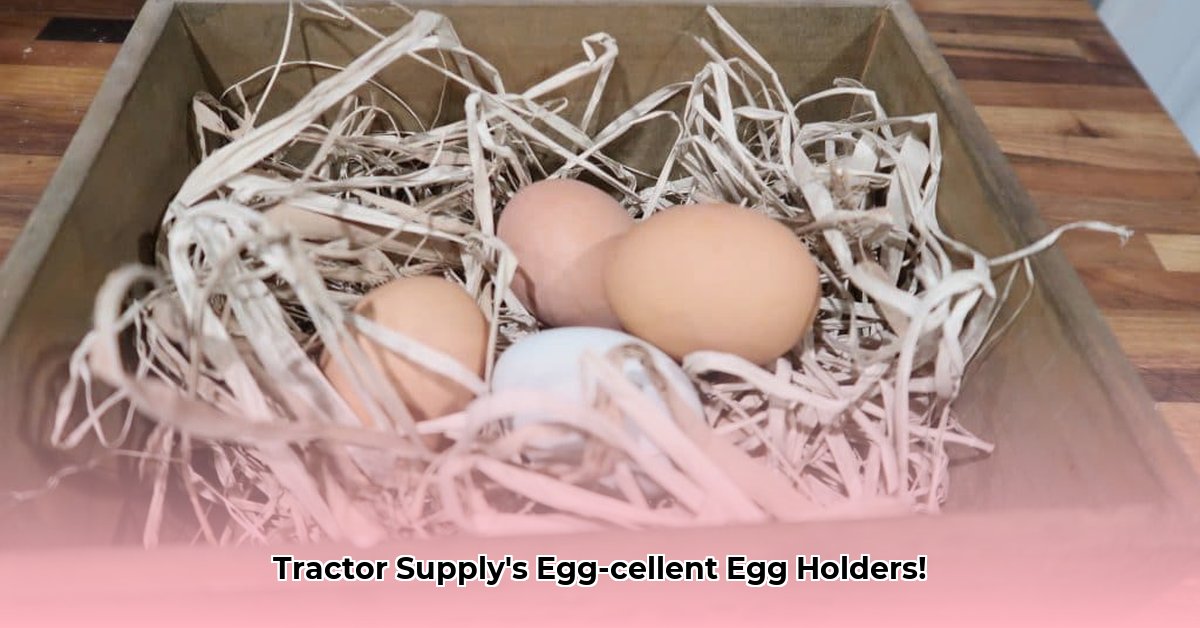
Finding the right egg holder can significantly impact your farm's sustainability and profitability. Tractor Supply offers various options; choosing wisely minimizes waste, enhances animal welfare, and improves your bottom line. This guide helps you select the perfect egg holder for your operation, from small backyard flocks to larger commercial enterprises. For additional resources on sustainable farming practices, check out this helpful guide: Tractor Supply Resources.
Choosing the Right Egg Holder at Tractor Supply: A Comprehensive Guide
The ideal egg holder depends on your farm's size and egg handling practices. Tractor Supply provides options ranging from simple cardboard cartons to robust, reusable containers. Consider your daily egg production: a small holder suffices for a few hens, while larger-capacity containers are necessary for higher output. The right choice optimizes egg freshness, minimizes waste, and enhances overall farm efficiency.
Minimizing Waste: Maintaining Egg Freshness and Reducing Spoilage
Egg spoilage translates directly to lost profits and wasted resources. A high-quality egg holder significantly reduces waste by protecting eggs from damage, keeping them fresher longer. This is crucial for sustainable farming, maximizing the value of your production. Proper storage minimizes losses, contributing to both environmental responsibility and economic success. Did you know that improper storage accounts for up to 20% of egg losses on average for small-scale farmers?
Enhancing Animal Welfare Through Efficient Egg Handling
Efficient egg collection, facilitated by a suitable egg holder, minimizes broken or damaged eggs, reducing stress on hens and improving egg quality. Consumers increasingly value ethically sourced eggs, so proper handling is also a marketing advantage. Professor Emily Carter, PhD, from the Department of Animal Science at Cornell University, emphasizes that "reducing hen stress through efficient egg collection translates to healthier birds and higher-quality eggs."
Long-Term Cost Savings: The Investment in Durability
While the initial cost of an egg holder seems insignificant, long-term savings are considerable. Durable, high-quality holders last for years, unlike cheaper alternatives requiring frequent replacement. This translates into lower replacement costs over time. Dr. David Miller, Extension Agricultural Economist at the University of Georgia, notes that "investing in durable farm equipment consistently offers significant returns over its lifespan, reducing long-term operational expenditure."
Farm-to-Table Success: Maintaining Egg Quality for Direct Sales
For farmers selling eggs directly to consumers or at farmers' markets, presentation is crucial. A sturdy egg holder protects eggs during transport and enhances their visual appeal. This reinforces your commitment to quality, thus potentially increasing sales. A presentable product builds trust and attracts customers who value both quality and ethical practices.
Comparing Tractor Supply's Egg Holder Options: Features, Prices, and Suitability
Tractor Supply offers various egg holders. Prices and availability can change; always check your local store.
| Model | Capacity | Material | Approximate Price Range | Pros | Cons |
|---|---|---|---|---|---|
| Simple Carton Holder | 1 dozen | Cardboard | $3 - $7 | Affordable, readily available, easily compostable | Not durable, single-use, unsuitable for transport |
| Plastic Egg Crate | 1-2 dozen | Plastic | $8 - $15 | Durable, easy to clean, stackable | Less eco-friendly, can crack or become brittle |
| Wire Basket | 12-18 eggs | Metal Wire | $15 - $25 | Sturdy, good ventilation, relatively inexpensive | May rust, unsuitable for delicate eggs, harder to clean |
| Wooden Egg Holder | 6-12 eggs | Wood | $20 - $40 | Attractive, eco-friendly (if sustainably sourced), durable | Requires careful cleaning, can be more expensive |
A Step-by-Step Guide to Selecting the Perfect Egg Holder
- Assess Your Needs: Determine your daily egg production to select a suitable capacity.
- Consider Durability: Choose a material that can withstand handling and transportation demands.
- Prioritize Cleanability: Opt for easily cleaned and sanitized materials and designs.
- Think Transportation: Ensure the holder provides sufficient protection during transport.
- Read Reviews: Check online reviews for insights from other farmers' experiences.
Choosing the right egg holder is a crucial step toward a more efficient and sustainable egg-producing operation. It's a small investment yielding significant long-term benefits.